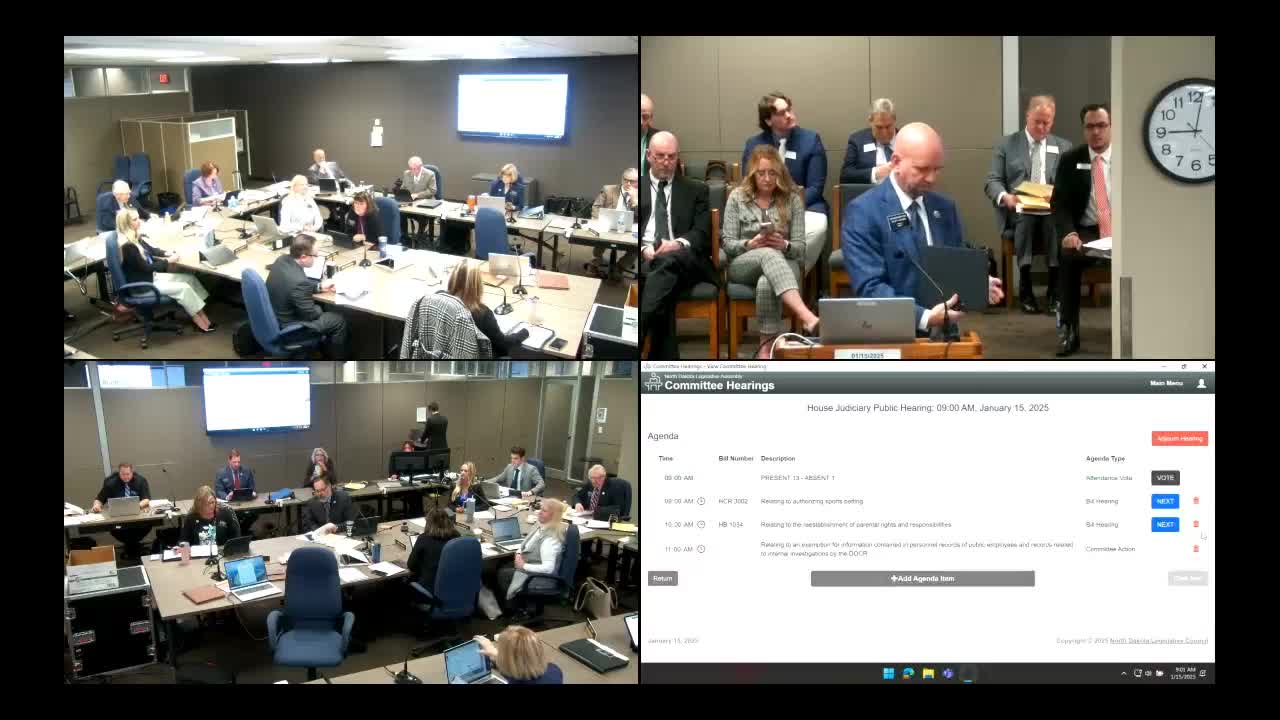House Judiciary committee hears public testimony for and against putting sports betting on the 2026 ballot
Get AI-powered insights, summaries, and transcripts
Subscribe
Summary
The House Judiciary Committee opened a hearing on a proposed constitutional amendment, House Concurrent Resolution 3002, that would authorize sports betting on professional and collegiate athletics and dedicate revenue to K–12 education if voters approve it on the November 2026 ballot.
The House Judiciary Committee opened a hearing on House Concurrent Resolution 3002 on whether to place a constitutional amendment authorizing sports betting on the November 2026 ballot.
Representative Scott Louser, R‑Minot, who introduced the resolution, told the committee the amendment would allow wagering on professional and collegiate sports only and said revenue generated would be dedicated to K–12 education. "This is one of those rare occasions where the legislature would consider putting something on the ballot," Louser said, adding the proposal would not include high school sports.
Louser framed the measure as giving voters the choice. "This is a matter of allowing the voters of North Dakota to decide if they want to," he said, arguing the state currently sends wagering revenue to other states and citing national growth in legalized sports betting.
Testimony in opposition focused on harms to college students and student athletes, financial impacts on lower‑income households, and increases in problem gambling and related social problems. Katie Fitzsimmons, director of student affairs for the North Dakota University System, urged a "do not pass" recommendation, saying the negative consequences for student athletes and college students are "deeply concerning." Fitzsimmons cited studies she said link legalized sports betting to increased household financial distress, higher rates of bankruptcy and overdrafts, and greater risk of gambling disorder among young men.
Representatives of student groups and campus leaders echoed those concerns. Carter Gill, vice president of governmental affairs for the North Dakota Student Association, said student delegates oppose expansion of sports betting because it targets college‑age men and has been associated with increased online abuse and harassment of athletes. He referenced university reports of increased counseling demand tied to gambling. Jacob Thompson, a policy analyst for North Dakota Family Alliance Legislative Action, and David Tamesia of the North Dakota Catholic Conference also testified in opposition, warning that tax revenue would not offset social costs and that sports betting would "spoil the nobility of sport."
Committee members asked questions about revenue estimates, administrative costs, and safeguards. Louser estimated potential revenue in the range of $25 million to $30 million annually and said regulation and taxation details would return to the Legislature if voters approved the ballot measure; he said the Legislature would set the regulatory framework in the 2027 session. He said gaming regulation is currently administered in the Attorney General’s office but that the Legislature could later move authority to a gaming commission.
Opponents pressed for narrower language if the committee advanced the resolution, requesting exclusion of collegiate athletics and proposition ("prop") bets to protect student athletes. Fitzsimmons and Gill described studies they said show heightened rates of problem gambling and abusive online behavior tied to prop bets and college sports in other states.
The committee received written testimony submitted online in support of the resolution but took no formal vote during the hearing; the panel closed the hearing after receiving multiple in‑person and written statements.
The hearing record here is limited to testimony and committee questioning; no committee recommendation or final action was recorded in the transcript.
